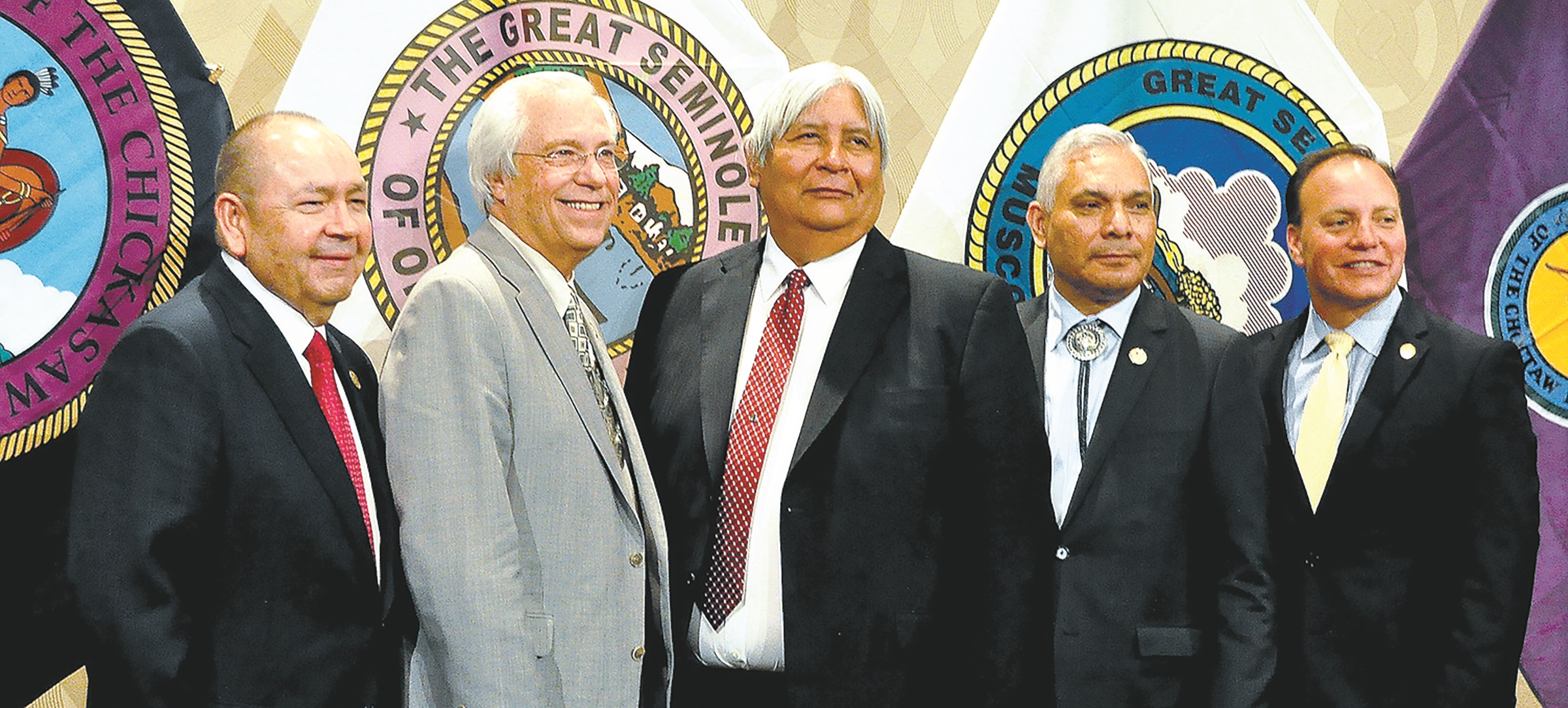Inter-Tribal Council backs shared funds for Ind
CONTRIBUTED BY Gene Lehman, Media Relations.
This article appeared in the May 2016 edition of the Chickasaw Times
CATOOSA, Okla. – The Inter-Tribal Council of the Five Civilized Tribes has passed a resolution encouraging the Bureau of Indian Education to develop a Joint Venture funding program similar to that used by the U.S. Indian Health Service.
The resolution was adopted during the Council’s recent quarterly meeting in Catoosa.
With 55 of 78 Bureau of Indian Education schools in “poor” condition, the BIE has a backlog of more than $1.3 billion in construction and rehabilitation projects. Many BIE schools need immediate replacement and repair. Some of the schools have been on a priority list for a decade.
Tribes willing and able to partner with BIE could enter into a joint venture-like program with BIE by funding construction in exchange for fixed operations and maintenance costs.
The Council also backed legislation passed by the Oklahoma House of Representatives in March that amends the American Indian Arts and Crafts Sales Act of 1974. The new bill defines “American Indian tribe” as any Indian tribe federally-recognized by the Bureau of Indian Affairs (BIA) and defines “American Indian” as a citizen or enrolled member of a federally recognized tribe. The council urged the Oklahoma Senate to approve the measure saying it “is an important bill that strengthens the American Indian Arts and Crafts Sales Act of 1974.”
Several other resolutions gained unanimous support of the council’s voting members.
They include:
-
Support for the United National Indian Tribal Youth (UNITY) mission, which fosters the spiritual, mental, physical and social development of American Indian and Alaska Native youth to build a strong, unified and self-reliant Native America through involvement of its youth. It urged tribes to support the 2016 UNITY national conference in Oklahoma City July 22-26. Without the support from all Native Americans, UNITY cannot complete its mission, the council stated.
-
Renewing a pledge of support for the Indian Child Welfare Act of 1978. The Act ensures Native children removed from their homes are adopted or cared for by relatives or in Native American homes. The council said the ICWA “is a vital part of federal Indian law legislation that is especially important to non-reservation tribes located in Oklahoma because a great number of our citizens do not reside in Indian Country,” and asserted “a legal and media attack is currently being waged against ICWA which could have ramifications on all tribes and Indian children and families.”
-
A request to museums and research institutions promoting the history, art, language and culture of the Five Tribes to require proof of tribal citizenship of artists who claim to be affiliated with the tribes. The request comes because many artists who claim to be part of the Five Tribes are not enrolled as members or citizens.
-
A request of emergency supplemental funding to slow the spread of the Zika virus to avert a “wave of preventable birth defects” and to protect pregnant women, infants and children from the devastating infection. The Zika virus is mostly contracted in foreign countries, however, mosquitoes carrying the virus have been detected in the southern United States.
-
A resolution against Oklahoma State Question 777 which will be on November’s general election ballot. The question would prohibit state legislators from passing laws necessary to protect the lands, lives and farms of Oklahoma citizens, including Native Americans of the Five Tribes who live in Oklahoma. The council elaborated by saying citizens of the Five Tribes farm and raise livestock and have a “responsibility to ensure land, air and water are protected and preserved for the next seven generations.” In order to continue the lifestyle, the legislature must be involved in agriculture’s future to protect Native and non Native American farmers, the resolution states.
-
Support for State Question 780, which reclassifies certain low-level crimes such as simple possession of drugs, in addition to property offenses under $1,000 as misdemeanors rather than felonies. Passage of the bills would save taxpayers by lowering the amount of money spent annually in Oklahoma to incarcerate individuals who break such laws.
-
Support for State Questions 781, which is linked to passage of 780. It sends the savings back to local communities for mental health and substance abuse treatment, job training and employment programs. Currently, the state budget for corrections is approximately $500 million per year, an increase of 172 percent over 20 years, the council pointed out. Oklahoma jails more women than any other state and is second nationally in total incarceration, the council noted. Inter-Tribal Council resolution 16-12 states passage of the questions “will allow Oklahoma to invest tax dollars in local communities to rehabilitate citizens, which is a more effective approach to crime reduction and keeping communities safe.” The council voted unanimously to urge state voters to pass the measures.
The Inter-tribal Council represents more than 500,000 Native Americans who are enrolled members of the Chickasaw, Cherokee, Choctaw, Muscogee Creek and Seminole tribes.